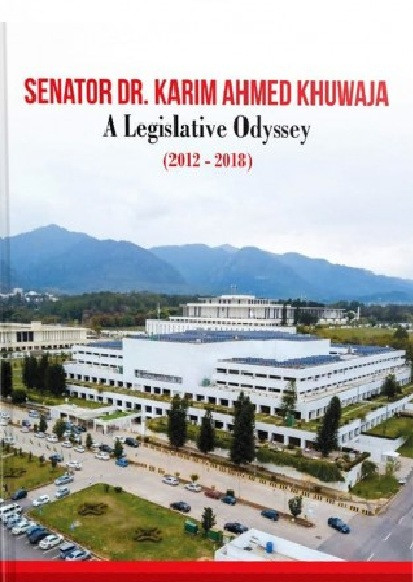Perhaps for the first time in history, an elected parliamentarian has compiled his journey at the parliament of Pakistan in a book titled "A Legislative Odyssey.” The book elucidates the true power of parliament and the fundamental purpose of its establishment within the constitutional framework.
The author of this book, former senator of the Pakistan People's Party, Dr Karim Ahmed Khuwaja, who served as senator in the upper house of the parliament during a six-year tenure from 2012 to 2018, describes his book as a documented journey at the parliament house and the initiatives proposed by him for the sake of public good.
The book offers a vast discussion on the importance of public interest and the vision of a parliamentarian to keep public interest, welfare and benefit on top of his priority list. The book opens up with a note from the author, dedicating his book to the first woman Prime Minister of the country Benazir Bhutto, the political workers committed to prevalence of democracy, and fellow Pakistani citizens thriving tirelessly for the bright future of Pakistan.
The author of the book Dr Karim Ahmed Khuwaja who hails from Tando Muhammad Khan was born to Professor Madad Ali Khuwaja an eminent academia and writer. Before venturing into mainstream politics of the country, he remained associated with student politics and other platforms of grass-root level politics to burnish his abilities. In his book, Dr Khuwaja has made a slight revelation regarding his days of struggle and route to the upper house of the parliament.

Dr Khuwaja has had a distinguished career, serving as President of the Sindh People's Student Federation, heading the Sindh People's Doctors Forum of Pakistan, and holding key roles in various organisations, including the Sindh Human Rights Commission and the Pakistan Psychiatrist Society.
He was also a dynamic participant in the MRD movement, consistently dedicating himself to serving the poor masses of Pakistan. As one of the leading psychiatrists of the country, he was able to observe the society minutely and that experience proved beneficial in making him an upright parliamentarian and an innovative legislator.
The book thoroughly lays bare the need of effective and productive legislation in an underdeveloped country like Pakistan and setting up subsequent mechanisms for its implementation. It comprises bills passed, bills introduced, resolutions moved, discussions held and motions brought during the term of Dr Khuwaja as Senator. The author recalls his meeting with Benazir Bhutto pertaining to the issue of orphans and begging children. He reminisced his days as a practicing psychiatrist in Thatta when he was called upon by Benazir Bhutto to discuss the core issue of beggar children. She expressed her grave concerns, and decided to take measures for its prevention, but predicted that the issue would escalate in the coming years.
As a senator, Bhutto’s vision encouraged him him to get the law passed from the upper house of the parliament for the welfare of orphans and neglected children in 2016, while the bill was actually moved back in 2013.

The act titled ‘Un-attended Orphans Rehabilitation and Welfare Act, 2016, provided legal protection to the rights of orphaned children and ordained punishment for offenders involved in compelling orphan children to beg. The law made it mandatory for NADRA to trace and register unattended and orphaned children along their place of residence and their workplace.
It took Dr Khuwaja around five years to compile data and substantiate a book featuring key legislations and resolution on core issues related to general public. He has also discussed the dire need of enacting law to prevent cyber crime.
While sharing his thoughts on PECA-Prevention of Cyber Crime, the author has mentioned in the book that during the past few years with the growing influence of social media and internet, a large number of youth were found mentally disturbed after being harassed on social media, besides being stalked and blackmailed. In order to protect the privacy of the common man on social media accounts and safeguard his dignity, regulations and laws were crucial.
The move for abolition of section 325 from Pakistan Penal Code through Criminal Law Amendment Bill 2017 was introduced by the Dr Khuwaja in the Senate, in view of the rising suicide cases across the country. He has argued that section 325 provides punishment for a person who attempts to commit suicide, which is an attempt made in a state of frustration and desperation. But if the person survives, state punishment works to further disrupt the person’s mental status. Dr Khuwaja believes, that it is important to provide rehabilitation of such victims.
It is interesting to note that the law protecting animals from human cruelty, "The Prevention of Cruelty to Animals Act 1890," has undergone only three amendments since its enactment, all of which occurred during the British era. It was for the first time after independence that a bill for amending this particular law was introduced by Dr Khuwaja with the aim that progressive societies also take steps for the protection of creatures in urban or rural areas. Using his vast knowledge and being a keen observer of society, he urged the upper house of the parliament to revisit the Indus Water Treaty and the Water Accords of 1960 and 1991. On March 9, 2015, on his recommendation, the Senate of Pakistan urged the Federal government to evaluate the situation of sea intrusion and water scarcity in the coastal areas of Sindh and Balochistan.
Dr Khuwaja has also proposed in his book that the process of legislation and the methods applied in Pakistan should be updated through cogent working and microscopic evaluation. He has mentioned contributions of his parents, colleagues and party leadership in shaping his skills as a worker as well as a politician. During the launching ceremony of this book in Islamabad earlier this year, speakers at the event termed the book as a milestone in the history of Pakistan’s politics and a guide book for Pakistan’s legislators.
As senator, Dr Khuwaja visited various countries to represent Pakistan in different conventions and conferences shedding light on core humanitarian issues where he shared his ideas.
Acknowledging the efforts of Dr Khuwaja, Nayyar Bukhari, former chairman of the Senate described the book as a ready reference for future parliamentarians regarding the history and contribution of country’s upper house. The book also contains a detailed discussion initiated by the members of the senate on the matters of public importance and fundamental rights.
A Legislative Odyssey will benefit a broad range of readers, including parliamentarians, researchers, and students of parliamentary studies, by providing valuable insights into legislative practices and policymaking dynamics. Besides this one, the author also has four more books to his credit, along with a book titled Arzooh-e-Mohib, where Dr Khuwaja has lovingly compiled poetry by his grandfather Mohaib Ali Khuwaja.
Kamran Khamiso Khowaja is a practicing lawyer and freelance journalist. His areas of interest are cultural diversity and socio-political issues of Sindh. He holds a Master’s Degree in Law and tweets as @ZaibSha1
All facts and information are the sole responsibility of the writer
